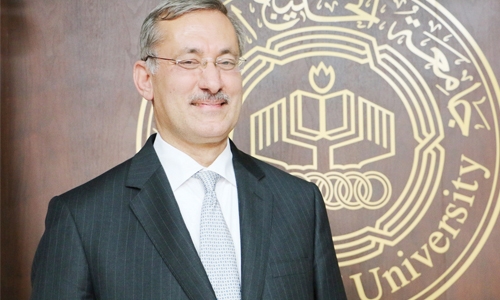Innovative cities : Bahrain as a model of excellence
Cities are designed to achieve many goals including the attainment of order, efficiency, and equity. Cities consume about 75% of world natural resources and 80% of energy. It is projected that by 2040, cities will contribute to 75% of global GDP. Cities were branded as digital, smart and innovative through harnessing information and communication technology to improve urban design and infrastructure systems to support economic, business, industrial, and cultural development. However, disruptive technologies like drones, self-drive cars, and robotics are shaping future cities. Emerging technologies like artificial intelligence, biotechnology, and nano-technology are likely to define new form of the future city.
In the era of the Internet of Things, Bahrain is leading several models of innovations as manifested in its experience in e-banking, e-government, e-health, soil-less and smart agriculture as illustrated in the Peninsula Farms. The program of economic transformation in Bahrain and the support of SMEs by TAMKEEN is a good example of sound positioning and alignment between financial and social capitals. Bahrain innovative capability is manifested in its ability to attract a critical mass of experts, professionals, and scientists and to develop a sustainable funding in collaboration with private sector and civil society so as to develop an eco-system for innovation in many fields like manufacturing as in the case of ALBA, GPIC and BAPCO, service sector, and higher education and health.
The key question is what ranking Bahrain score in innovation at the global arena. The 2017 Global Innovation Index (GII) prepared by Cornell University and INSEAD reveals that the top countries in innovation include Switzerland, Sweden and Netherland. Among the top ranking five Arab countries in GII in 2017 are UAE, KSA, Kuwait and Bahrain ranking 35, 55, 56, and 66 respectively out of 130 scale. It is noted that there is a gap between industrialized and developing nations which is reflected in the number of patents and expenditure on R&D. Besides, it is alarming to note that less than 1% of GDP is allocated to research and development in most developing countries.
Leading innovative countries are characterized as hosting global cities. Global cities are correlated with many attributes including investing in innovation, leapfrogging new business models, forming global networks and partnerships, and good governance models. In the Global City Index, Bahrain ranked 8 and Dubai ranked 2 which is a measure that reflects the quality of business culture, ICT infrastructure, think-tanks, banking systems, and logistics. Bahrain succeeded to qualify as one of the most efficient logistics centers which contributes to about 17% of GDP.
Driven be a mission to be a global innovative nation, Bahrain is investing in service and experience innovation in business, science, medicine, tourism, culture, and education sectors through adopting new business models. In essence, the innovative capability of Bahrain is underpinned by sound information and communication technology, green technologies, and innovations in infrastructure systems in water-energy-food technologies.
Prof. Odeh Al-Jayyousi, Head of Innovation and Technology Management, Arabian Gulf University, Bahrain; E-mail: odehaj@agu.edu
Related Posts

